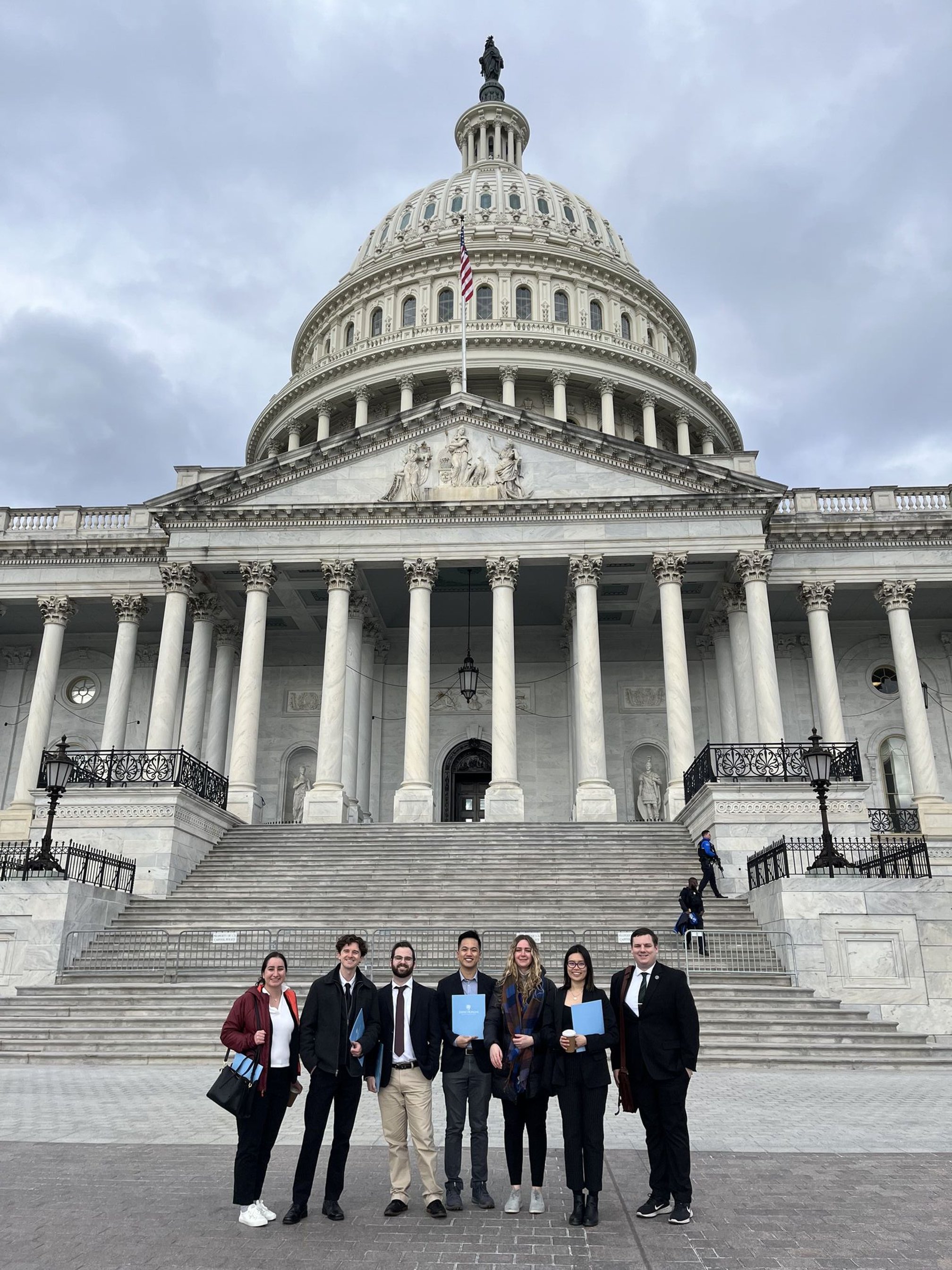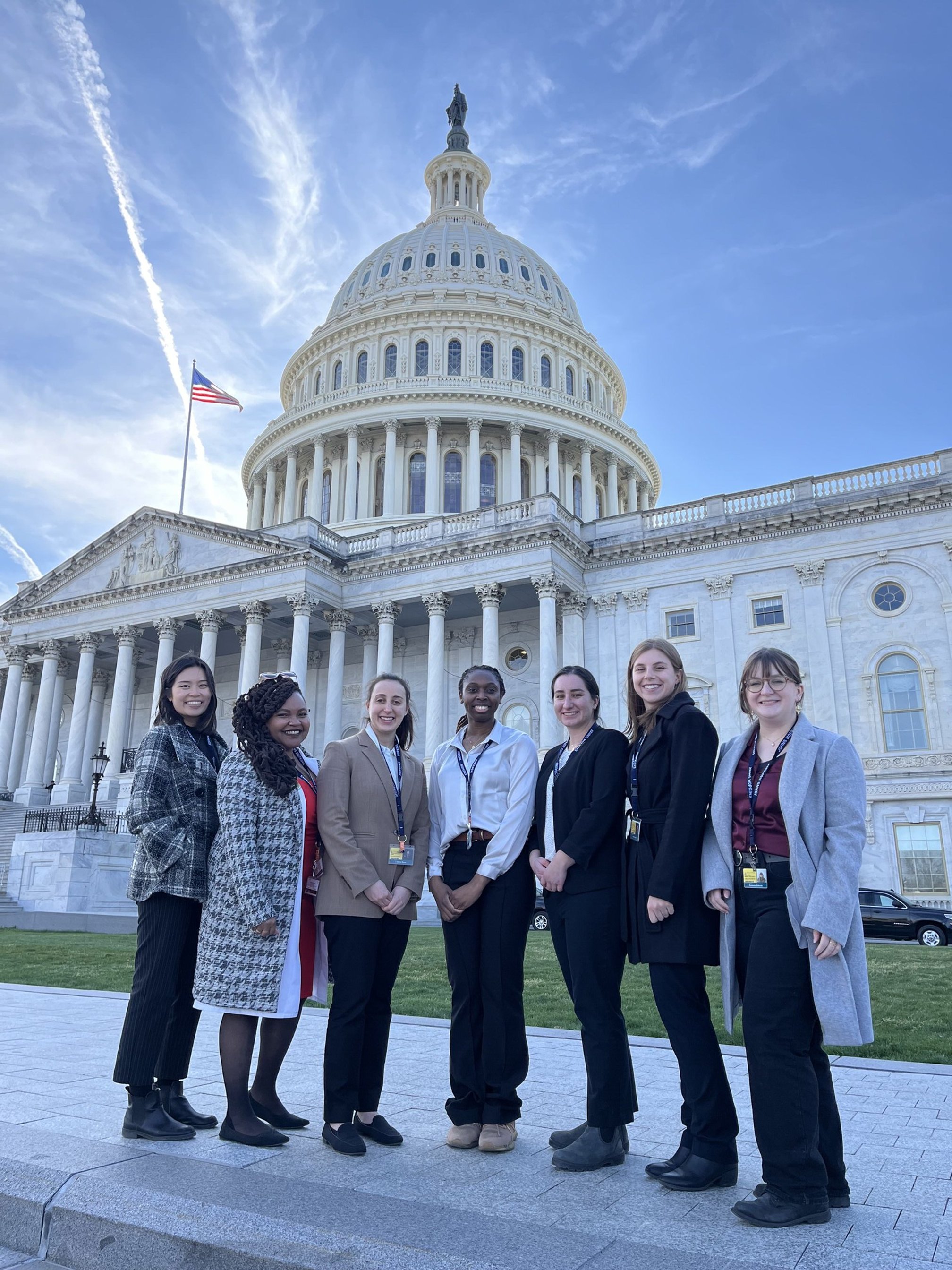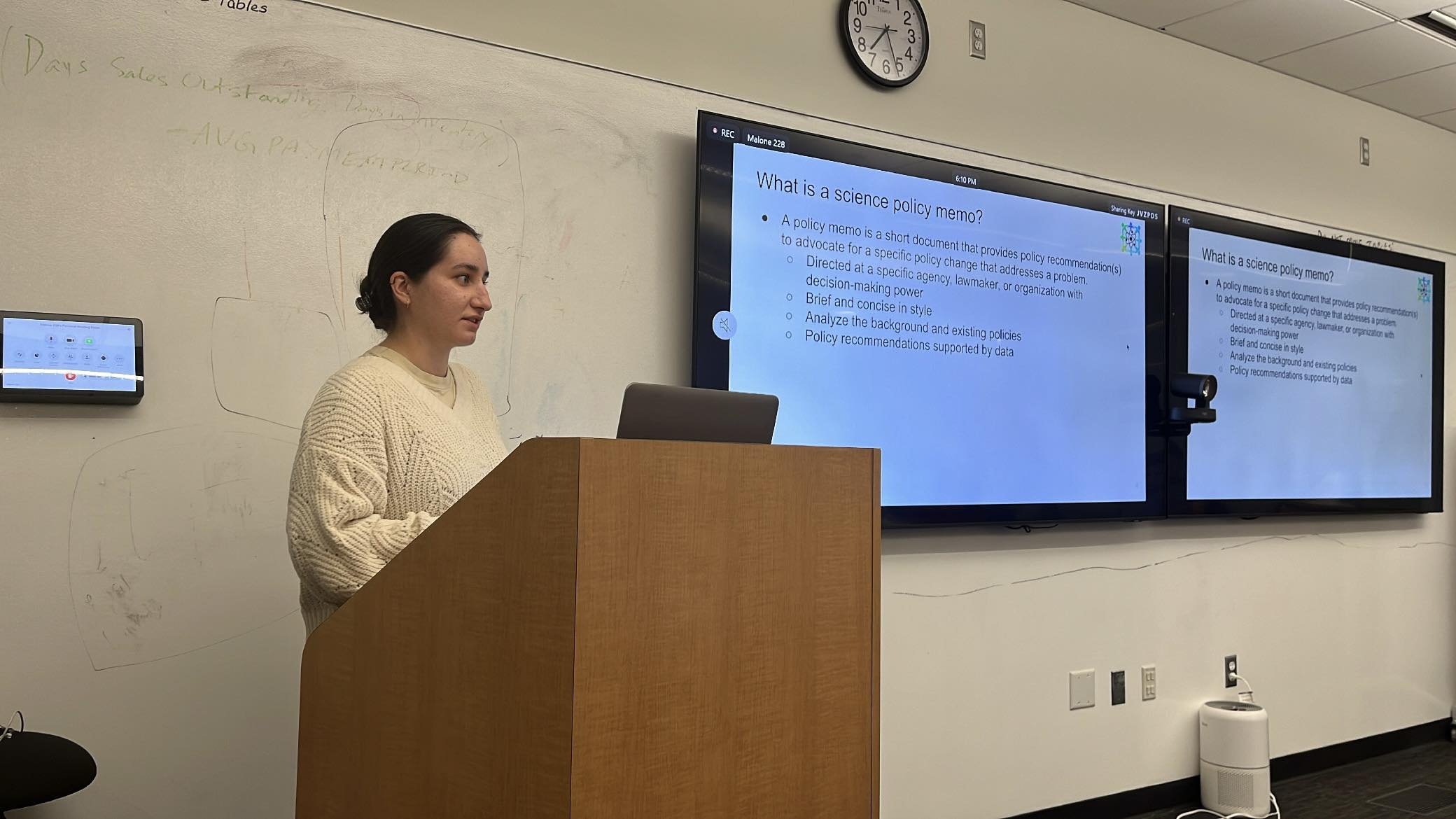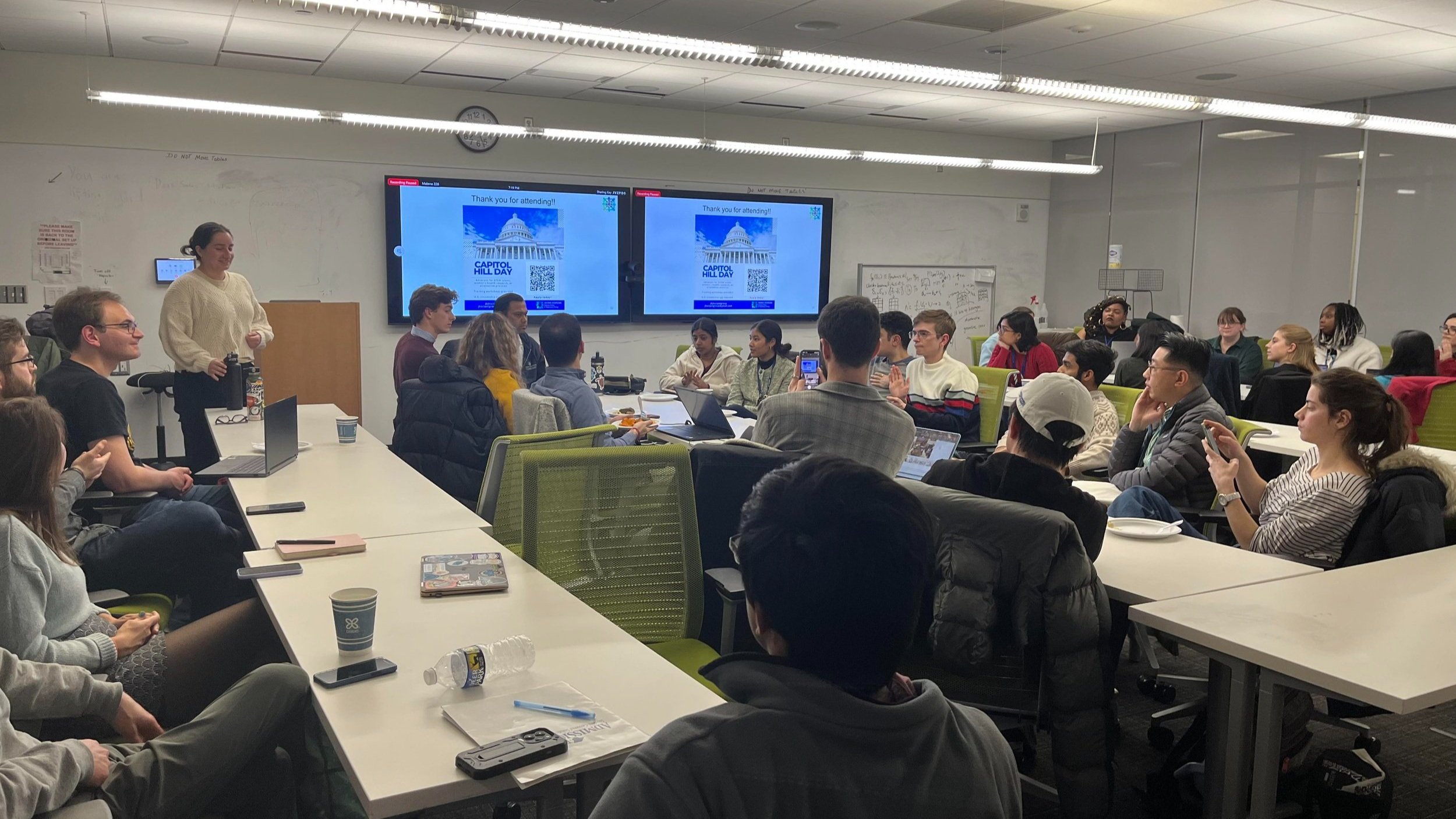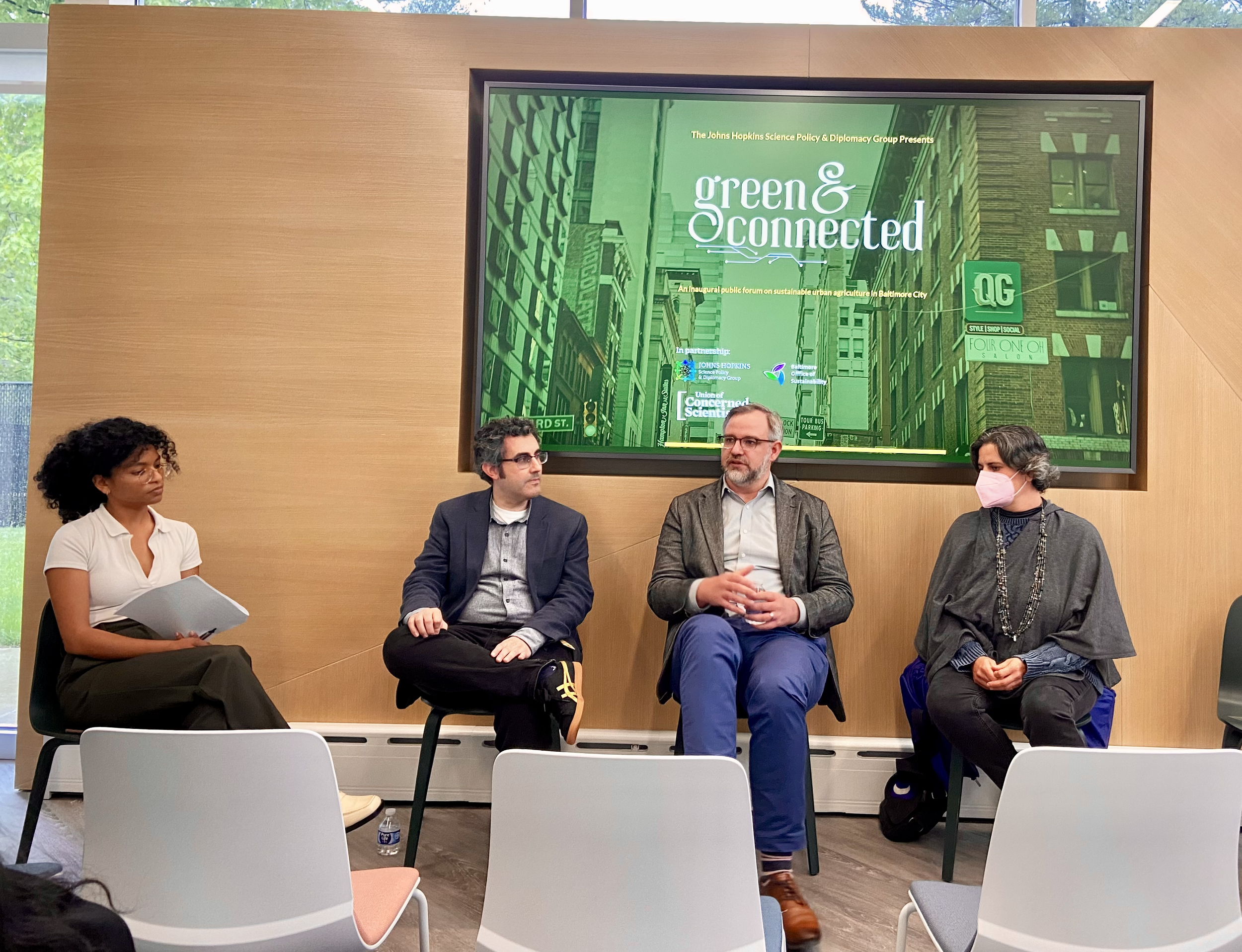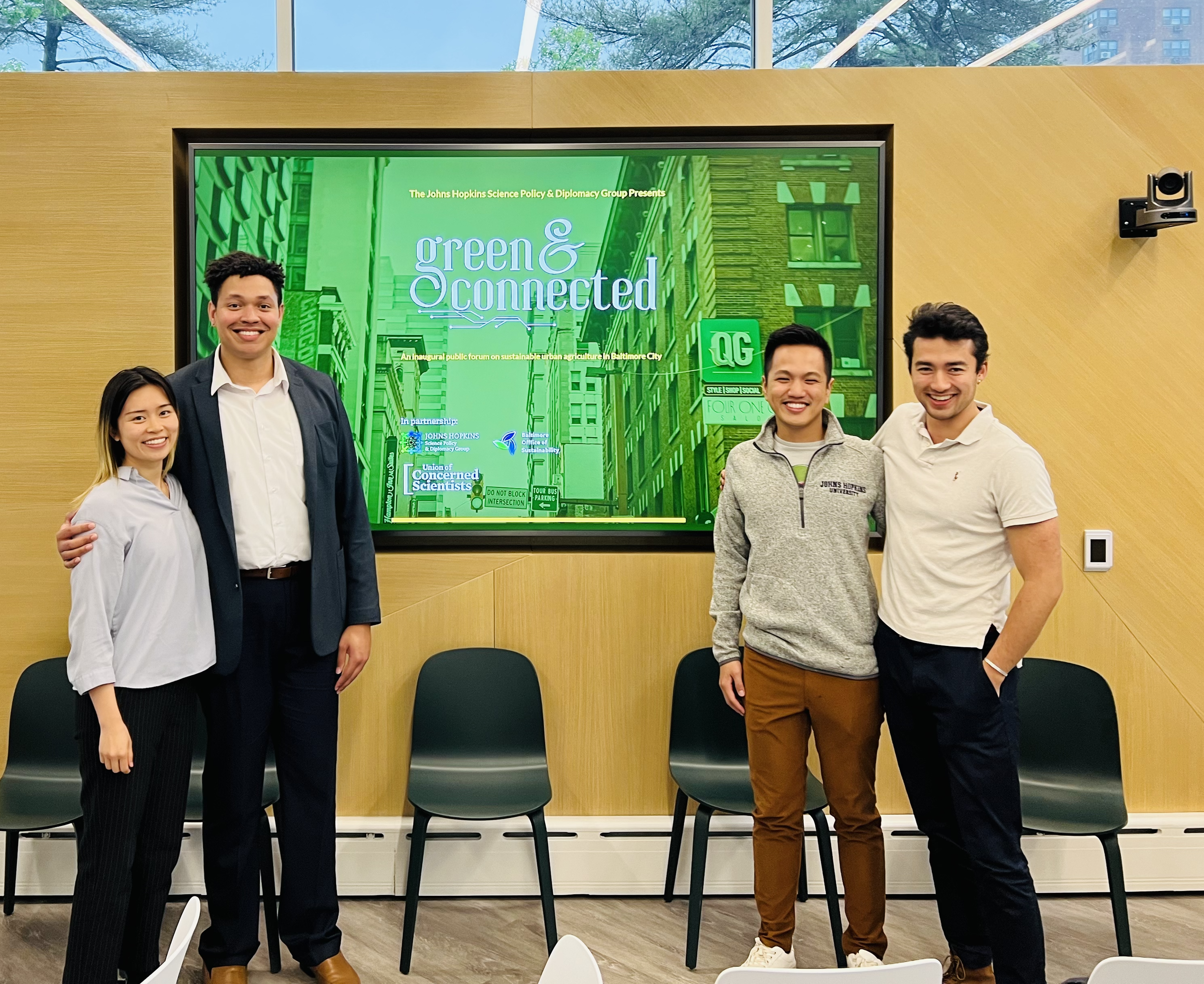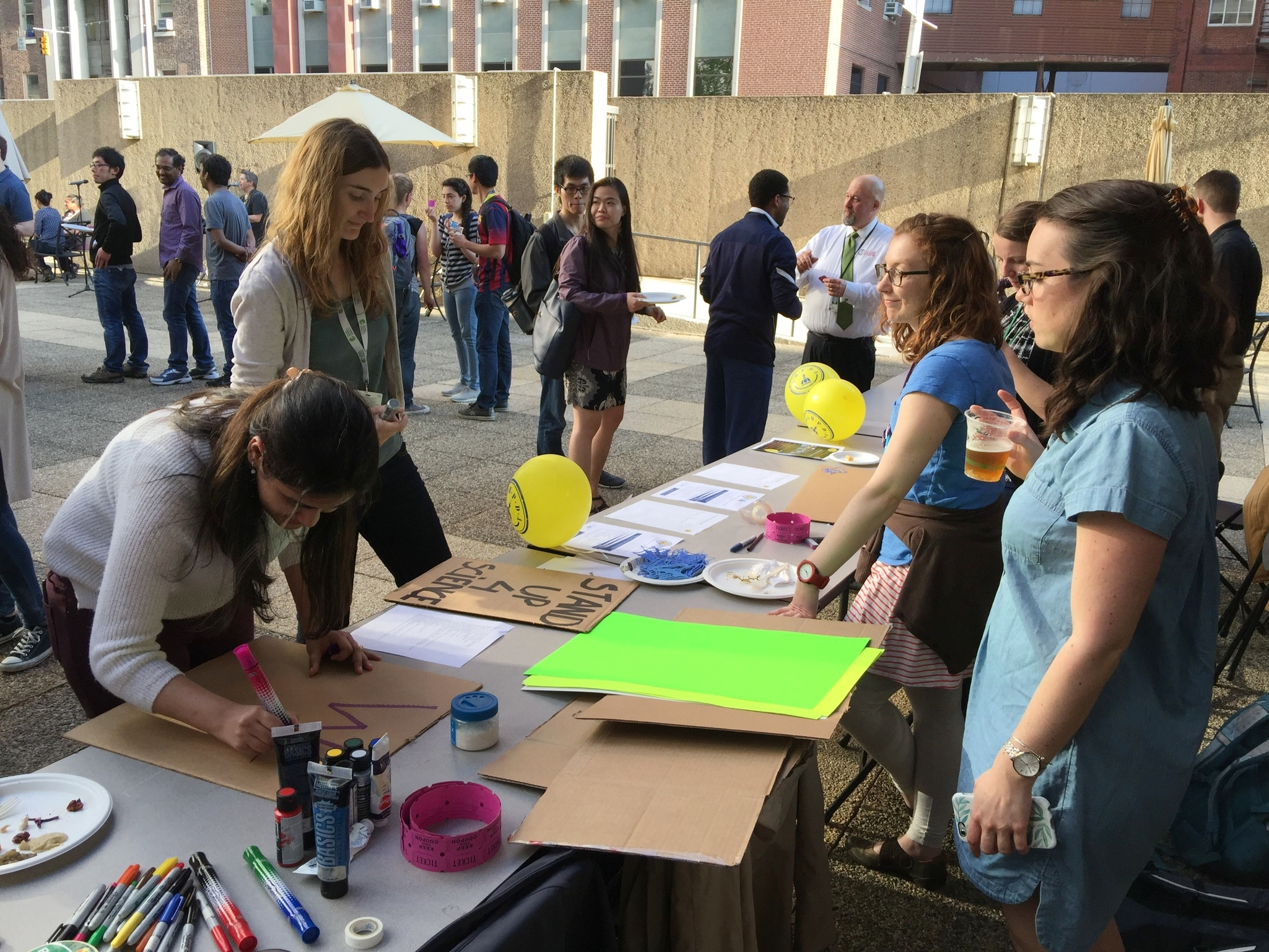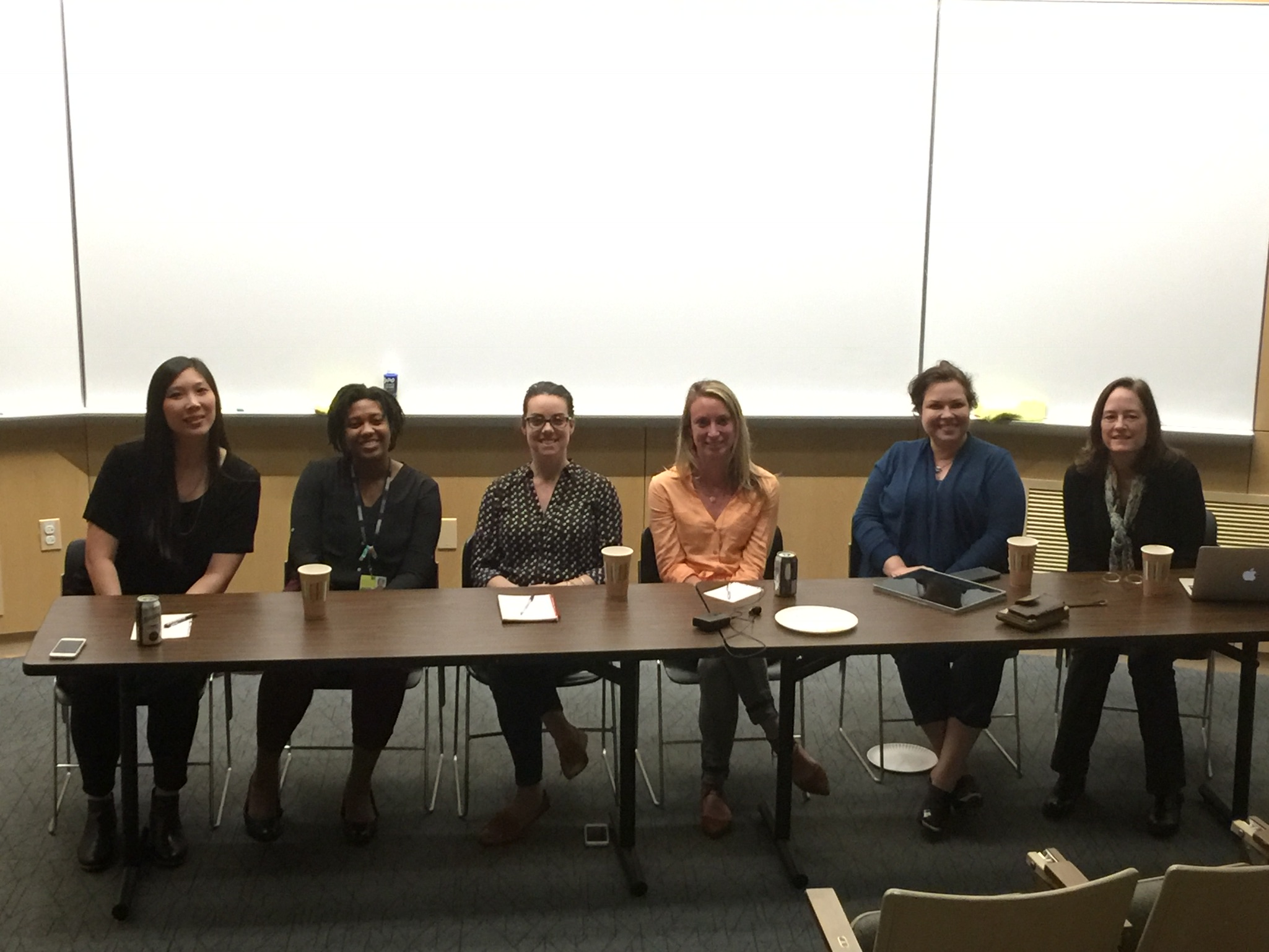"We are shaping future leaders in science policy, bridging the gap between research and legislation for a more informed, sustainable world."
Recent Publications in the Journal of Science Policy & Governance
October 2024
We are proud to announce that two pieces from our group have been published in Volume 25, Issue 1 of the Journal of Science Policy & Governance (JSPG). This effort stems from an extensive research, writing, and editing process to offer policy solutions to important science policy issues currently facing the United States.
The first piece is a policy memo written by Ona Ambrozaite (JHSPDG President), Corinna Torabi (JHSPDG Science Policy Coordinator), Nathan Van Damme (JHSPDG Science Policy Coordinator), Daniel Velez, and Michel Wallemacq, focusing on methods to accelerate the development of offshore wind, an industry that is underdeveloped in the United States. The proposed policy solutions focus on standardization measures to streamline manufacturing, shipping, and installing wind turbines.
Second, authors Brendon Davis (JHSPDG Science Policy Coordinator), Milad Razavi-Mohseni (JHSPDG Science Policy Coordinator), John Soltis, Hao Nick Zhang (JHSPDG VP Science Diplomacy), and Erin Kavanagh wrote a policy brief highlighting the importance of international STEM graduate students in contributing to American economic competiveness. Policy solutions here include allowing greater flexibility for specific student visas, changing visa cap requirements, and increasing the unemployment grace period for work visas.
See publications below, and visit the whole JSPG issue here.
Hill Day 2024
March 2024
The Science Policy Division of the Johns Hopkins Science Policy and Diplomacy Group (JHSDPG) sent three distinct delegations of graduate students and research fellows to Capitol Hill in Washington, D.C. This effort was led by Brendon Davis (JHSPDG Science Policy Coordinator) who coordinated the logistics and training sessions for all three groups.
The alternative protein delegation, co-led by Vivian Su (JHSDPG VP Science Policy) and Corinna Torabi (JHSPDG Science Policy Coordinator) was joined by Nick Zhang (JHSPDG VP Science Diplomacy), Brendon Davis, Ona Ambrozaite (JHSPDG President), Nico Swanson, and Michael Dryzer. Delegates spoke with members of Congress about the role of alternative proteins in transforming the food system and bioeconomy, especially the opportunities to support small farmers and rural communities. They emphasized the need to support the PLANT Act (H.R.5023) to facilitate this transition.
Brendon Davis, Ona Ambrozaite, Nick Zhang, Erin Kavanagh, John Soltis, Parsa Farhang, Ranjitha Ravindranath, and Vivian Su advocated for international students at US universities by discussing the importance of the Keep STEM Talent Act of 2023 (S.2384) with lawmakers. The bill aims to facilitate the visa process for international Master’s and Ph.D. students in STEM fields at American universities while potentially having a significant and positive economic impact.
The women’s health research advocacy group led by Lauren Hesse (JHSPDG Science Policy Coordinator) aimed to garner legislative support for the White House Women’s Health Research Initiative. Delegates Abigail Fennell, Nzinga Mack, Phebe Ekregbesi, Ramona Johnson, Corinna Torabi, and Vivian Su joined Lauren to advocate for increased women’s health research funding and non-financial policy approaches to overcome barriers in conducting sex-based research and improve clinical outcomes for women. The researchers also shared insights from working within the field and discussed how such policies directly impact their efforts in advancing studies related to women’s health, including research about triple negative breast cancer, autoimmune diseases, and pregnancy complications..
JHSPDG is grateful to Brendon, leads, and delegates for their time and efforts to support high impact initiatives that aim to benefit multiple communities. The group would like to thank the National Science Policy Network (NSPN)’s CDF+ funding support. The group also expresses gratitude to the Congressmembers, staffers, and experts who have provided guidance. Our team looks forward to continuing to advocate for these important issues.
The White House Visit
February 2024
The Leadership Board of the Johns Hopkins Science Policy and Diplomacy Group (JHSPDG) was honored with an opportunity to visit the White House in Washington, D.C., to engage in discussions at the intersection of science, policy, and diplomacy.
Thanks to the generosity of Mr. Nick Polk, Acting Branch Director of Federal Cybersecurity in the Office of Management and Budget, faculty and graduate students from JHSPDG, SAIS Emerging Technologies Initiative, and SAIS Technology Club participated in productive discussions with the White House staff members. The Johns Hopkins delegation met with key advisors from the Office of Management and Budget, Office of Science and Technology Policy, and Office of the National Cyber Director, including Ms. Clare Martorana, Federal Chief Information Officer. Topics that were discussed ranged from global health and climate change to emerging technologies and international cooperation.
The visit highlighted the critical role of science in informing evidence-based policymaking and advancing diplomatic initiatives. JHSPDG remains dedicated to addressing society’s most complex challenges through advocacy, communication, and engagement in science policy and science diplomacy.
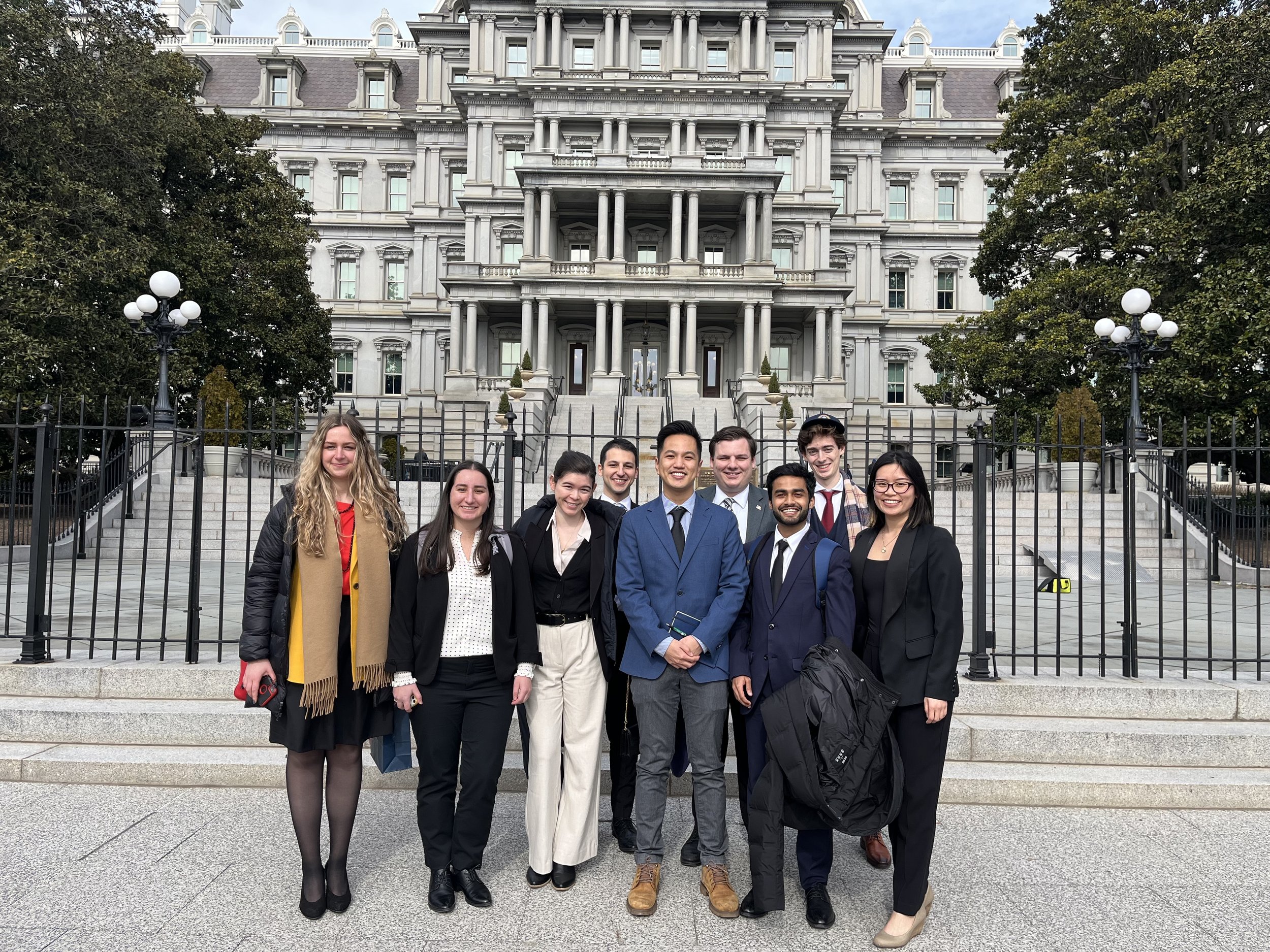
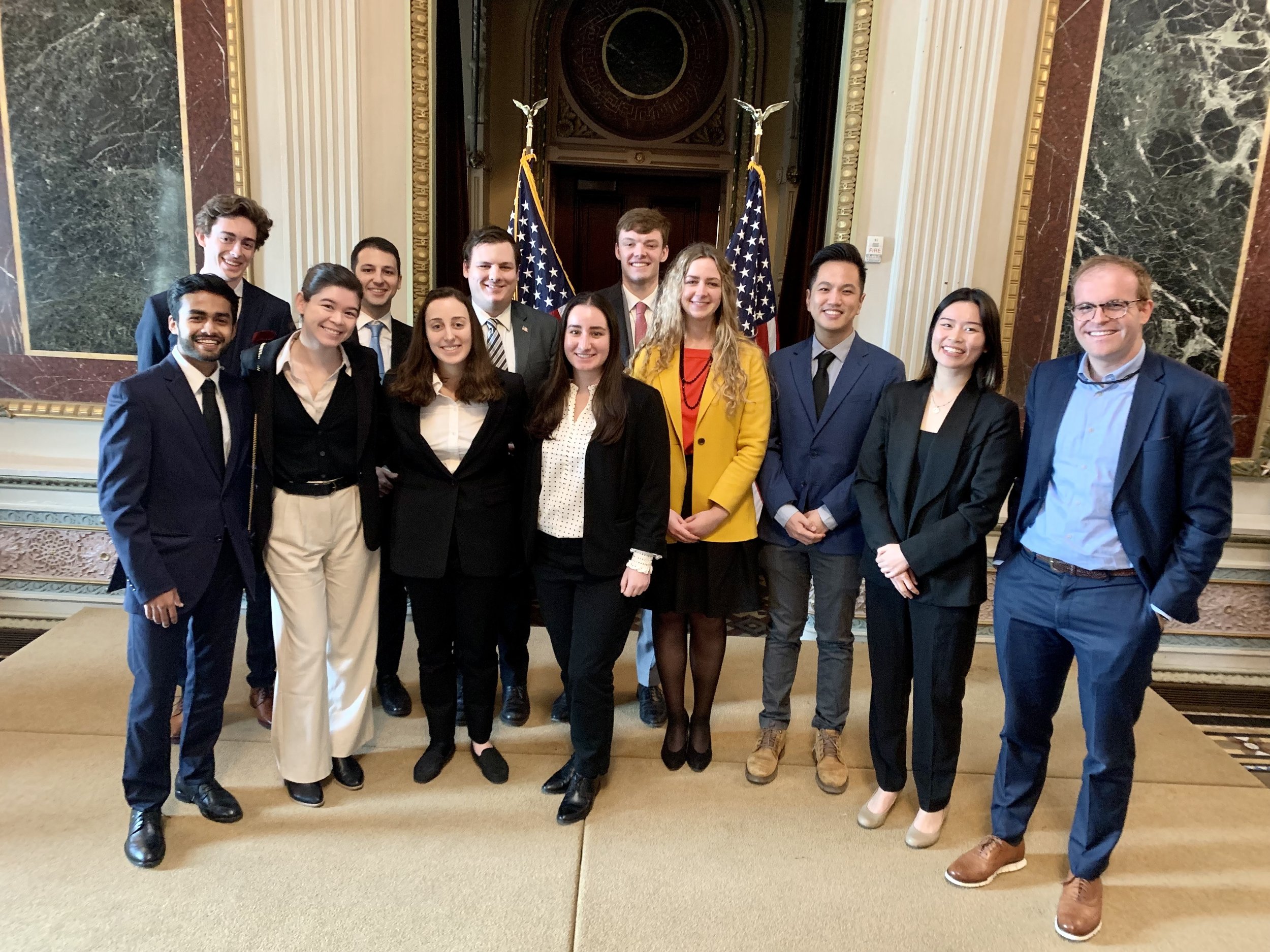
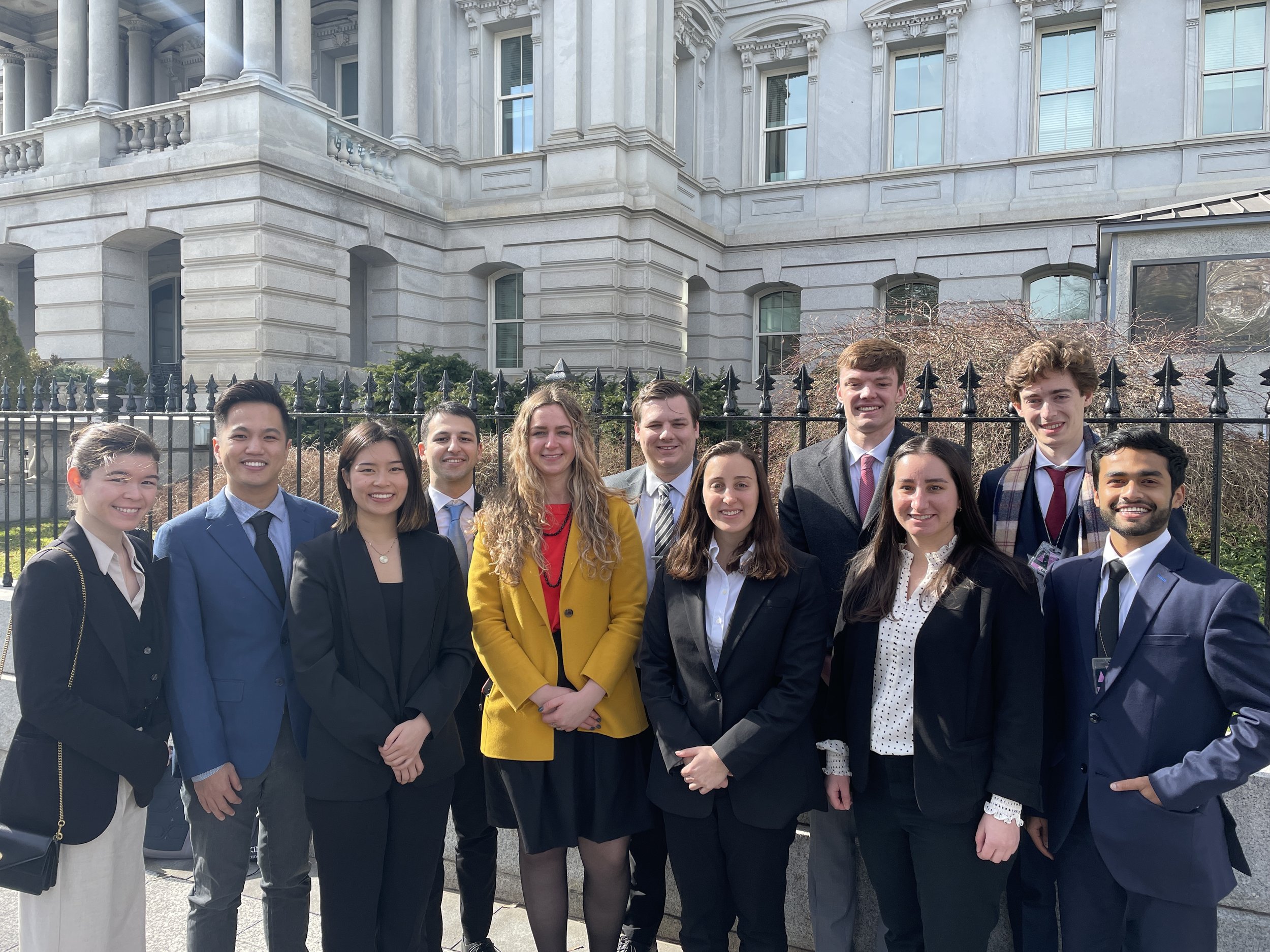
101 Series: Science Policy Memo Writing Workshop
February 2024
The Science Policy Memo Writing Workshop was the first event of the 101 Series: Advocate. Communicate. Engage., an introductory series of workshops and seminars to provide STEM graduate students with the fundamental knowledge and tools for both science policy and diplomacy. Led by JHSPDG Science Policy Coordinator, Ms. Corinna Torabi, the in-person event attended by over 30 graduate students and research associates from various academic backgrounds. The workshop began with an opening remark from Ms. Ona Ambrozaite, JHSPDG President, who introduced the launch of the series and the group’s Hill Day initiative. Ms. Torabi delved into the structure and processes for researching and writing an effective science policy memo, and emphasized the importance of understanding the intended audience(s). The workshop concluded with a practical session from Ms. Vivian Su, JHSPDG Vice President of Science Policy. Participants practiced developing an outline of a policy memo under the guidance of Hill Day delegation leads Ms. Lauren Hesse (Science Policy Coordinator) and Ms. Su.
The Science Policy Division thanks all attendees for actively participating in the workshop. Our goal is to provide tools and networks for early career scientists to learn how to leverage their technical expertise in evidence-based policymaking within all levels and branches of the government.
Inaugural Green&Connected Forum
April 2023
Funded by the Union of Concerned Scientists Science for Public Good Fund, the Green&Connected initiative is our robust response to the need for sustainable urban agriculture in Baltimore City. Our mission extends beyond mere sustainability; we aim to transform access to fresh, nourishing food and strengthen the social fabric of Baltimore City.
Our inaugural forum, held on Friday, April 28th, assembled a respected panel of experts, including Dr. Keeve Nachman from the Center for a Livable Future, Abby Cocke from the Baltimore Office of Sustainability, Dr. Michael Bader from the 21st Century Cities Initiative, Nat Adams from the Johns Hopkins University Department of Anthropology, and Alice Reznickova from the Union of Concerned Scientists. Together, they illuminated the landscape of urban agriculture in Baltimore City, unraveling the intricacies of green spaces and their role in enhancing health and wellbeing.
Our discussions delved into the crucial policies required to ensure that inhabitants of densely populated urban environments have consistent access to fresh food. The forum, however, was more than an exchange of ideas; it culminated in a reception that facilitated closer, more personal interactions among students and experts. With an open invitation extended to graduate students from Baltimore universities and the general public, we fostered a platform for engagement, education, and evolution towards a sustainable urban future.
Climbing the Hill: Science Communication with Congress and Other Policymakers
April 2023
The Johns Hopkins Science Policy & Diplomacy Group (JHSPDG) in partnership with the U.S. Government Accountability Office (GAO) curated an insightful and transformative workshop - "Climbing the Hill: Science Communication with Congress and Other Policymakers." Held at the cutting-edge Imagine Center for Integrative Learning and Life Design, this unique event represented a significant intersection between science, policy, and effective communication.
Guided by the expertise of Shenandoah Sowash and Ben Shouse from the GAO, our brilliant science graduate students from Johns Hopkins University embarked on an educational journey. They learned not just how to communicate their scientific research convincingly to policymakers, but also how to inspire these key decision-makers to act on pressing scientific issues.
The workshop also offered a deep dive into the GAO's approach, highlighting its commitment to offering non-partisan, actionable information on science and technology to Congress. This, in turn, shed light on the vital role science communication plays in policy-making, influencing not just local but national decisions.
This collaborative experience stands as a testament to our ongoing mission: preparing the next generation of researchers to be not just excellent scientists, but also effective communicators and influencers in the policy arena. We remain committed to creating platforms for learning, development, and exchange, helping mold the future vanguards of science policy and diplomacy.
JHSPDG Hosts the Pew Research Institute
November 2022
Dezmond Cole led the JHSPDG in hosting a captivating career education seminar with the Pew Research Institute. The seminar was attended by eager trainees who were interested in learning about the role of the center. Alec Tyson, the Associate Director of Science & Society at Pew Research Science, was the keynote speaker. He enthralled the audience with his insights and expertise, providing a comprehensive briefing on the center's role and its findings on public views of scientists.
Alec shared exciting examples of the center's work, including their measurements of American views on science-related issues such as COVID-19 and climate change. These thought-provoking examples sparked lively discussions among the trainees and kept them engaged throughout the seminar.
The highlight of the seminar was the Q&A session with Alec, where the attendees were given the opportunity to ask questions and get first-hand insight into the exciting experience of working at Pew. Alec's engaging and informative answers provided the attendees with a deeper understanding of the work being done at the center and inspired them to consider a career in science and research.
Overall, the seminar was a dynamic and engaging learning experience, providing the trainees with valuable knowledge and inspiration for their future careers.
To watch the recording, visit: https://www.youtube.com/watch?v=vXJFSP-iN2w
JHSPDG Hosts the Journal of Science Policy & Governance
November 2022
Led by Dezmond Cole, this seminar was a thrilling opportunity to learn from Dr. Shweta Galapati, the Director of Engagement & Outreach at the Journal for Science Policy & Governance. Dr. Galapati spoke about the exciting opportunities that come with working and publishing in the Journal, which has established itself as a world-renowned, peer-reviewed publication in the field.
The Journal of Science Policy & Governance has been on a mission to empower students, post-docs, policy fellows, and early career scholars in science, technology, and innovation policy and governance. Since its inception in 2011, JSPG has been a platform for young researchers to showcase their work and develop their skills in science policy.
Overall, the seminar was a fantastic opportunity to gain valuable insights and knowledge from a leader in the field. The Journal of Science Policy & Governance is at the forefront of elevating young researchers and shaping the future of science policy and governance, and the seminar was a testament to the exciting work being done by JSPG.
To watch the recording, visit: https://youtu.be/bKKD7TYFDxI
Science Communication Workshop Series
January - March 2022
Lead by Steven Jerjian, JHSPG hosted four virtual workshops on the theme of science communication with invited expert speakers, supported by funding from the National Science Policy Network Chapter Development Fund. Workshops covered effective scientific writing techniques, science data visualization, policy brief writing, and science policy writing in government roles, with each workshop garnering an excellent turnout. 14 attendees received certificates of completion for attending at least 3 sessions, and several attendees also used what they had learn to submit policy briefs to the 2022 National Science Policy Symposium Policy writing competition.
Collaboration - The Baltimore Transit Equity Coaliton
February 2022
During Black History Month, JHSPG hosted a virtual panel discussion on “Transit equity and the environment: A vision for Baltimore” in collaboration with the Baltimore Transit Equity Coalition (BTEC). Panelists included BTEC President Samuel Jordan, JHU environmental health researcher Dr. Megan Latshaw, Maryland Delegate Sheila Ruth, and Michael McMillan, President of the Amalgamated Transit Union Local 1300. Over 60 people participated in the session, contributing to a great discussion of policies and actions to bring transit equity to Baltimore. https://www.youtube.com/watch?v=lRpuyZZyf7M
Science Communication and Memo Writing Seminar
November 2021
Bernat Navarro-Serer, Dezmond Cole, and Ona Ambrozaite gave a seminar on science communication and memo writing to MSPH students in the Department of Population, Family & Reproductive Health at the JHU Bloomberg School of Pubic Health. Co-lead by Dr. Asari Offiong, this seminar taught first-year graduate students about key elements of the science policy space.
JHSPDG Science Policy Writing Competition
January 2021
The Johns Hopkins Science Policy Group hosted a Science Policy Writing Competition to give early career scientists the opportunity to practice their skills with policy memo, op-ed, and testimony writing. Participants chose to write a policy memo, an op-ed, or deliver a mock testimony. Winners in each category received a small cash prize from JHSPG and the winners of the Policy Memo Group category were submitted to the International Policy Memo Competition. As part of the competition, our Policy Chair Maddy McKeague hosted a weekly policy writing workshop to help participants develop their pieces.
STEMulate The Vote! Initiative
November 2020
In the fall of 2020, we launched STEMulate The Vote!, an initiative to increase the voter awareness and civic engagement of STEM students. The initiative programming was comprised of five key components: Election Info, Seminar Series, SciPol Issues, and Op-Ed writing. Through this initiative, we engaged registered voters nationwide and connected students with policy experts at various institutions around the country. Check out the article that the Johns Hopkins University published on the initiative in The Hub: https://hub.jhu.edu/2020/10/19/stemulate-the-vote/
Publication in the Journal of Science Policy & Governance
October 2020
E. Rosalie Li-Rodenborn, Bernat Navarro-Serer, Stephanie Pitts, and Kavya Anchuri published a policy memo titled Improving Healthcare Access Among the Newly Decarcerated in the Journal of Science Policy & Governance with Honorable Mention. The publication highlighted policy options that ensure former inmates have quality healthcare access. Check out the publication here: https://doi.org/10.38126/JSPG170209
Virtual Prescription Drug Affordability Town Hall
August 2020
We hosted federal drug pricing policy expert Dr. Mariana Socal, Drug Affordability Deputy Director of the Maryland Citizens Health Initiative Catherine Kirk Robbins, and Johns Hopkins School of Medicine PhD student Roshan Chikarmane for a virtual panel-style event on drug affordability. Panelists discussed the efforts made on the state and federal levels to make prescription drugs more affordable to patients.
Applied Policy Workshop with Dr. Jacquelyn Campbell
November 2019
The Johns Hopkins School of Nursing and Bloomberg School of Public Health hosted a policy workshop that focused on what Dr. Jacquelyn Campbell coined the “4 P’s”: problem statement, policy development, political landscape, and pitch. Dr. Campbell is a national leader in research and advocacy on domestic violence and violence against women. Dr. Campbell gave a wonderful presentation on the importance of considering the 4 P’s in developing policy briefs. After the speech, the audience was divided into several groups to formulate and introduce policy briefs based on issues affecting marginalized communities and individuals. After that, she provided rich feedback
Science Policy Town Hall
October 2018
This panel-style event provided graduate students and staff the space to engage with faculty experts on critical science policy issues ahead of the 2018 midterm elections. Attendees and panelists discussed women's health and reproductive rights, led by Dr. Diane Horvath-Cosper, the director of Whole Women's Health of Baltimore; climate change, led by Dr. Tom Burke, former EPA Deputy Assistant Administrator and Science Adviser; and the opioid crisis, led by Dr. Travis Rieder from the Berman Institute of Bioethics. City Councilwoman Shannon Sneed also appeared on the panel and discussed efforts she has been involved in across Baltimore to support the environment and women’s health.
March for Science
March 2018
Celebrate Science!
March 2018
Johns Hopkins Science Policy collaborated with our friends at SACNAS for the 2018 March for Science. In preparation we held a poster-making happy hour and headed down to D.C. together for the rally and march. We were inspired by the creativity and passion on display. Through our actions in the lab, at our institutions, and through our public advocacy we can create a more equitable and just world.
See this lovely write-up by Allison McCague for the American Society of Human Genetics! http://www.ashg.org/education/newsletter/201805_newthismonth.shtml
National School Walkout for Gun Policy Reform
March 2018
On March 14, 2018, JHSPG and Doctors For America organized over 100 Hopkins affiliates to walk out of their classrooms and laboratories in solidarity with the Parkland shooting survivors and in support of federally-funded gun violence prevention research. JHSPG President Richard Sima and the Director of the Johns Hopkins Center for Gun Policy and Research, Dr. Daniel Webster, delivered remarks and the attendees observed a moment of silence. In the days following the walkout, JHSPG organized a poster-making happy hour and a Hopkins contingent to participate in the March for Our Lives in D.C.
Members of the Hopkins community gathered together with students across the country to say #ENOUGH to gun violence. We stand in solidarity with the victims of gun violence and call for the funding of gun policy research.
Tax Reform Advocacy
November - December 2017
The details of House Tax Cuts and Jobs Act (H.R. 1) threatened graduate students nationwide by removing exemptions for tuition waivers. The details very from case to case, but had the original bill passed, Hopkins graduate students would have seen their federal tax burden increase from ~9% of take-home income to ~38% of take-home.
Throughout November and December the Johns Hopkins Science Policy Group help several Advocacy events to lobby against H.R. 1. Students came together to write letters, send emails, and call the offices of Senators and Representatives from 9 different states.
March for Science
April 2017
Members of the Hopkins community came together to join in the March for Science on Earth Day 2017. In addition to joining the thousand of marchers in cold DC drizzle, our community came together for two other events.
Prior to marching we collaborated with sustainability groups to hold an earth day happy hour and to science poster-making party.
The following week students, faculty, and post-docs met in a town-hall style forum to discuss our experiences, and prioritize and plan our follow-up actions.
Congressional Postcard Party
March 2017
Our first official group event took place on March 16th, 2017. A total of 22 people stopped by to write a total of 84 postcards to 11 states. We wrote our representatives to either thank then for the support of science funding and/or the Affordable Care Act (ACA), or to urge them to stand up for them.
Writing a postcard doesn’t take too much time. Below you will find some of the templates that we used in this event. To easily find the contact info of your representative please use the http://www.govtrack.us website as a good starting place.
You can use an already made postcard, or you can make your own with a simple index card. On one side you address it to the person of interest allotting enough space for a postage stamp (postcard stamps run about 34 cents right now- 2017). On the other side, you can write your message.
Your message can follow a script if you don’t know what to say, or you can consider sharing a personal story, which can increase the impact of your message. Including your zip code or stating that you are a constituent from your city (you don’t have to provide your full address if you don’t want to) can also really increase the impact of your message.
SCRIPT FOR YOUR GOVERNOR:
Hi, my name is [NAME] and I’m a constituent from [CITY, ZIP].
I’m writing to urge Governor [NAME] do everything in their power to resist attempts to institute a per capita funding structure for Medicaid. Medicaid is a cost-effective program that provides millions of people with essential healthcare coverage.
SCRIPT FOR YOUR SENATORS/REPS:
Hi, my name is [NAME] and I’m a constituent from [CITY, ZIP].
I’m writing to oppose the American Health Care Act’s provisions to roll back federal funding for Medicaid expansion and institute a per capita Medicaid funding structure. Medicaid is a cost-effective program that provides millions of people with essential healthcare coverage.

